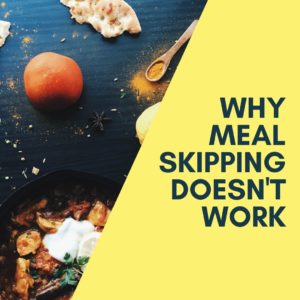You are not alone if you try to kickstart weight loss by skipping breakfast and lunch, but by the end of the day you have a big meal, and you’re not seeing the pounds come off. It’s not your lack of willpower making you give in and reach for the carbs – it’s your body’s natural response to literally starving yourself all day!

When you eat something, your body recognises it has been fed and goes in to a ‘fed-state’, and the hormone, insulin, signals the body to store the energy you’ve eaten.
A few hours after a meal, your blood sugar levels drop, signalling to your body that it’s in a ‘starved state’. Another hormone, glucagon, acts mostly on the liver to make and release stored energy, in the form of glucose. Some energy also comes from muscle and fat.
During the starved state, your body is using its own stores to keep blood sugar levels stable and provide glucose, as energy, for your brain and other tissues to perform various bodily functions. The average person can survive for 1-3 months without food, from their own body stores alone!
When you’re skipping meals hoping the lack of energy you’re putting in will make you lose weight, your body doesn’t have weight loss on the agenda. Your body just wants fuel to function- whether from food, or from your body stores. The thing is, using your own stores is costly, and your body is primed to want to survive, so it will give you hunger signals to seek food. It’s like the fuel light coming on in your car when your fuel is getting low: your tummy will rumble, you may feel crabby (hangry) or lightheaded or get the shakes.
After using your own stores as fuel all day, and then finally succumbing to hunger and eating a large meal at night, the energy in the food will help to replenish your stores but it may also be over and above what you need, especially if you’re sedentary for the rest of the night.
We need to be in a better relationship with our bodies, and treat them well, and provide them with energy to function through regular meals and healthy snacks. It is possible to eat, not be starving hungry and still lose weight if overall, you’re consuming less than you need. However the other big question is why are you losing weight and should that be your focus? Instead can you think about what health behaviours you can change…. add in a portion of fruit a day, a daily walk, getting outside in nature, deep breathing for 5 minutes a day. All these things can help improve your health without that emphasis on it all being about weight.
Thanks to Naomi Leppitt for her help with this post.
References
Berg JM, Tymoczko JL, Stryer L. Biochemistry. 5th edition. New York: W H Freeman; 2002. Section 30.3, Food Intake and Starvation Induce Metabolic Changes. Available from: https://www.ncbi.nlm.nih.gov/books/NBK22414/